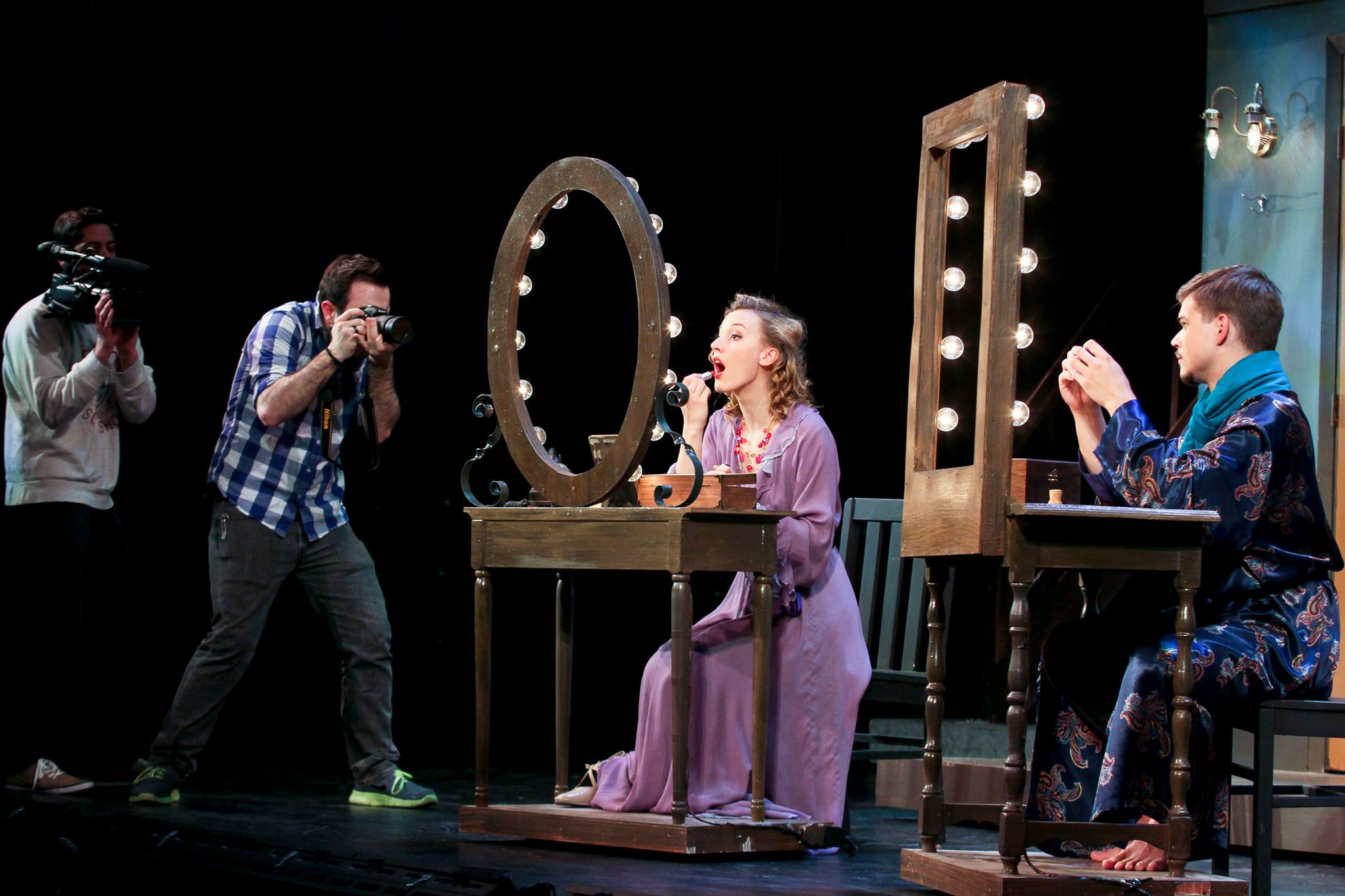Is a BFA Degree Part of the Recipe for Musical Theater Success?
Part I of my conversation with Joe Deer, co-author of Acting in Musical Theatre
Sooner or later, any serious singing actor faces the College Question – should I study musical theater in college? And what do I have to do to get into my “dream school” and continue my journey? Perhaps you’re facing that challenge now, or you’re a teacher whose students are grappling with these issues. Or perhaps you’re a college student or graduate blessed with hindsight about that big decision and its eventual outcome, or a college teacher involved in recruiting and screening prospective students. I’d love to hear about your point of view regarding college in the comments area below, whether you’re auditioning for it, you attended it, you avoided it, or you teach it.
 Recently, I had the opportunity to talk with someone who’s uber-qualified to offer valuable advice on this topic: Joe Deer, co-author of Acting In Musical Theatre: A Comprehensive Course and author of Directing in Musical Theatre. Joe is Distinguished Professor of Musical Theatre and Director of the Musical Theatre Initiative at Wright State University, where he heads the BFA Musical Theater Program. He’ll be offering a workshop at the upcoming Educational Theatre Association (EdTA) National Conference in Cincinnati for high school teachers who want to help their students prepare for college auditions. He had a ton of valuable advice about every aspect of preparing for college auditions, way more than I can fit in a single post. In this post, I’ll talk about Joe’s recommendations regarding choosing a degree; stay tuned for more of Joe’s wisdom in upcoming posts!
Recently, I had the opportunity to talk with someone who’s uber-qualified to offer valuable advice on this topic: Joe Deer, co-author of Acting In Musical Theatre: A Comprehensive Course and author of Directing in Musical Theatre. Joe is Distinguished Professor of Musical Theatre and Director of the Musical Theatre Initiative at Wright State University, where he heads the BFA Musical Theater Program. He’ll be offering a workshop at the upcoming Educational Theatre Association (EdTA) National Conference in Cincinnati for high school teachers who want to help their students prepare for college auditions. He had a ton of valuable advice about every aspect of preparing for college auditions, way more than I can fit in a single post. In this post, I’ll talk about Joe’s recommendations regarding choosing a degree; stay tuned for more of Joe’s wisdom in upcoming posts!
Why College?
Let’s start with the big question: do you want to study musical theater in college? Do you think that making, performing and teaching theater is likely to be an important part of your life for years to come? Then it’s smart to continue your training with qualified educators, and college is a great place to do that.
Of course, Joe says that, and of course I endorse his recommendation; after all, he and I are both professors who teach at schools with well-established BFA training programs. But we don’t make this claim just to boost enrollment at the schools that employ us. Nowadays, college is the “default” option for students considering a professional career performing in musical theater, and nearly every artist on a professional stage has a college degree on their CV. A good college experience will equip you with valuable tools and techniques, broaden your understanding of the arts and the world in general, and introduce you to fellow artists who are likely to become your lifelong friends and collaborators. It will help you make the transition from “student” to “professional” by providing career skills and networking opportunities.
It’s still okay, though, to question whether college is your best option. Maybe you’re impatient, and full of self-confidence. Maybe you don’t thrive in the classroom environment, or you’re not cut out for the “academic” side of college. There may be no good reason not to sally forth and begin your career right now. If you’re talented and a marketable “type,” you should give this some serious thought. Your youth is potentially one of your biggest assets, and spending the next four years in school might be a wasted opportunity. Voice lessons, dance classes and acting coaches can all be found outside the walls of the university, and online resources like The SAVI Singing Actor are available to provide additional specialized support wherever you are in your journey.
I’ve found that teenagers who have such a high level of self-possession is the exception, not the rule. One of the chief functions of undergraduate school is to provide students with the opportunity to finish growing up, in a stimulating and supportive environment. But college isn’t cheap, and you should weigh the value of the money that you will spend (and borrow) to attend against the value of growing up in the sheltered environment of the university.
Major in Theater?
Once you’ve decided that college is your path forward, is majoring in musical theater the right choice to make? Should you major in theater at a school that gives you a broad range of options and electives? Or choose a major in another field that you feel passionately about and study theater as an elective or extracurricular option? Each of these paths is a worthy one, and any of them could lead you to a role in a Broadway show or a life spent working in the professional theater.
Joe emphasizes the importance of thoughtful planning at the outset of your college search. Do you want to perform on a Broadway stage? Run a theater company in your hometown? Write or produce original work? Be a teacher? There’s no reason not to dream big at this point in your young life; very few people succeed without a big dream to keep them motivated. But it’s crucial that you think specifically about your own path, and not follow someone else’s. Take the time to consider these options and discuss them with the people you trust most – your friends, your teachers, your parents – then choose a degree path that fits with your dream.
BA or BFA?
If you’ve got your heart set on majoring in theater in college, the next big decision facing you is: BA or BFA? Actually, even stating the question that way is a little misleading, since it’s not a simple either-or choice between the Bachelor of Arts and the Bachelor of Fine Arts degrees. For musical theater, there’s also the BM (Bachelor of Music) route, and there are two-year Associates degrees (like the AA) and non-degree options available as well, but with Joe Deer’s help, we’ll tackle the controversial “To BFA or not to BFA” decision first.
College degrees are like recipes, or formulas, that dictate the distribution of credits and experiences that you’re likely to have during your time at school. Generally speaking, the BFA is more focused and intense. A larger percentage of the credits you take in a BFA program will be in the area of your major, and a smaller percentage will be devoted to electives and general studies (liberal arts or so-called “gen-eds”). In a BA program, a smaller percentage of course credits are devoted to the major, leaving you more freedom to explore a broader range of subjects and courses. Typically, the BFA requires an audition for admission (in some cases, a very competitive one), while the BA does not.
BFA: focused, intense, conservatory, vocational, audition
BA: broad, exploratory, liberal arts, no audition
The Bachelor of Music degree in musical theater, as its name implies, is a degree offered by a music program, and philosophically that means that music is the center of the training. In these programs, you’re likely to find more credits devoted to music than to theater or dance. Similar ingredients, but a different recipe, somewhere in-between the BFA and the BA.
Many people think that the BFA is the only way to go if you’re serious about your craft. If you get admitted to a BFA program, you’re more likely to be surrounded by serious, talented, highly-motivated classmates. The fact that these students had to clear the hurdle of a highly competitive audition and selection process to gain admission means you’ll be in pretty fierce company. And BFA programs tend to put more emphasis on career preparation, including opportunities for networking, self-promotion and professional development, which is another plus. But not everyone who wants a BFA can get in; most BFA programs have a limited capacity for enrollment. Nor can everyone afford them; “name” programs with strong cachet don’t need to offer much in the way of “discounts” and scholarships to fill their enrollment quotas, and the sticker price can be upwards of $50,000 a year – yikes!
Plus there is a potential downside that comes with the tightly-focused intensity of a pre-professional conservatory program. The pressures that come with high standards and a competitive student body can be overwhelming for some students. The narrow vocational focus of the curriculum often frustrates a student who seeks a broader, richer exploration in their undergraduate education.
Still, the impression is out there that the BA in theater is for the also-rans, the ones who aren’t quite good enough or rich enough to get into a BFA program. This impression is reinforced by the schools that offer a BA-to-BFA track, that is, a curriculum that admits students to a BA track and offers them the opportunity to audition (usually in the fourth semester) for admission to a more exclusive BFA track. It is Joe’s observation that at schools that offer both a BA and a BFA, the students in the BA track are likely to find their opportunities (and their self-esteem) diminished.
For what it’s worth, both Joe and I are graduates of BA programs, and we both did okay. Of course, in our day, dinosaurs roamed the earth, and the number of BFA conservatory programs was quite small; since then, we’ve seen a proliferation of BFA programs in musical theater, and an enormous growth in the pool of applicants seeking admission to such programs. But Joe and I both felt very well-served by our BA experiences. There was no New York showcase at the end, and no high-strung stable of thoroughbred students to compete with. There was, though, an abundance of capable, compassionate faculty and an environment that encouraged and supported exploration, risk-taking and project-based learning while holding students to a fairly high standard of excellence. There’s no reason to turn up your nose at the BA experience, even if you’re a serious singing actor. You can still get a first-class undergraduate education and continue to pursue your passion in a variety of ways.
It’s worth pointing out that the lines separating these degree options are blurry. There are BA programs with highly accomplished faculty and demanding advanced-level coursework, whose graduates are very competitive in the professional employment market. There are BFA programs that are increasing the breadth of their offerings, in the belief that students are not optimally served by a narrow trade-school orientation in their curriculum. Joe speaks for many educators in BFA programs when he observes, “We need to do a better job of encouraging our students’ curiosity and thinking of the educational opportunities that college can offer beyond vocational training.”
So, to return to my initial analogy, you need to consider the ingredients as well as the recipe – the faculty, the campus environment, the opportunities in the region. It’s possible to make a terrific dish using a simple recipe and outstanding ingredients, and the reverse is also true: a great recipe doesn’t guarantee a good meal if the right ingredients aren’t used. To sort them out, you’ll have to do your homework, and that’s what my next post will be about.
A Little Quiz
John Stefano from Otterbein University created a little quiz to see whether you’re more the BA or the BFA type. Try answering the following questions by circling the appropriate number from 1 to 7, where 1 = strongly disagree and 7 = strongly agree.
1. I absolutely cannot imagine being anything other than a professional actor.
strongly disagree 1 2 3 4 5 6 7 strongly agree
2. I want to learn about as many different subjects as I can in college.
strongly disagree 1 2 3 4 5 6 7 strongly agree
3. I am an actor, singer and a dancer, and I want to spend my life performing.
strongly disagree 1 2 3 4 5 6 7 strongly agree
4. I really enjoy spending time in classes in literature, history, social science, etc., listening to lectures and engaging in discussions.
strongly disagree 1 2 3 4 5 6 7 strongly agree
5. Except for being onstage, I’d rather be in dance class, or acting class, or choir than anyplace else in the world.
strongly disagree 1 2 3 4 5 6 7 strongly agree
6. I need lots of solitary time, to think and to write.
strongly disagree 1 2 3 4 5 6 7 strongly agree
7. I need to be active and busy all the time.
strongly disagree 1 2 3 4 5 6 7 strongly agree
8. I am really torn between doing a BA or a BFA degree in Theatre.
strongly disagree 1 2 3 4 5 6 7 strongly agree
Add up your scores on the even questions and the odd questions. If your score on the odd-numbered questions is significantly higher than your score on the even-numbered questions, then you’re probably going to be more comfortable in a BFA program. If your even score is significantly higher than your odd score, then you probably want to be in a BA program. And if your scores are more or less equal, you should examine both options closely, looking for a program that gives you the right balance of freedom and focus. There’s more about this quiz and this topic on a thread on the College Confidential forum:
For another point of view, there’s a compelling essay on “The Green Room Blog” titled “Why Your Degree Doesn’t Matter,” in which the author, who goes by the handle “The Reckless Artist,” writes about her college experience. She writes, “Most of the people I’ve met in my travels working around the world, not only have never heard of the “prestigious” department that I placed on such a pedastool [sic] when I went there, but they don’t know what a BFA is.” That’s an important reality check – what you do with your education is as important as the school you choose to attend.
So by all means, consider all the options when considering your future as a college student. I’ll pass along Joe’s valuable advice about choosing schools in the next chapter of this post.
Dear readers, what was your college experience like? Do you have any pearls of advice for prospective students? Or burning questions about this topic that I haven’t answered yet? Leave me a comment below!


Great post! Lots to think about. Thanks for quoting GreenRoomBlog.com!
Good advice, though the sweeping “BA, no audition” is not absolute. In face NAST accredited schools are expected to hold auditions or some other kind of screening even for BA students entering the program. We require an audition or portfolio presentation for the BA at IUP, and it serves us well to assure that there is a good fit between student expectations and what the department delivers.